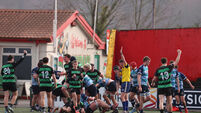Christy O’Connor talking points: Can the third-placed teams finally move up the grid?

CENTRE OF ATTENTION: Cork's Patrick Horgan signs autographs after the game. Pic: INPHO/INPHO/Laszlo Geczo
In the brutal arena of knockout championship, the underdog is often at the mercy of being brutalised by the bigger dog, eaten alive before even getting out of the kennel. When Tipperary met Offaly in last year’s preliminary All-Ireland quarter-final in Tullamore, their bite was so deep and vicious that Offaly were disfigured from the bleeding.
After capitulating so badly in their last round-robin game against Waterford last May, Tipp were snarling and growling from the first ball. Their final tally of 59 points was the highest since Wexford blasted Antrim for 12-17 (53) in the 1954 All-Ireland semi-final. Offaly weren’t in Tipp’s league but Tipp were so slick and ruthless that they looked primed for a shot at Galway in the All-Ireland quarter-final seven days later.
A collection of the latest sports news, reports and analysis from Cork.













